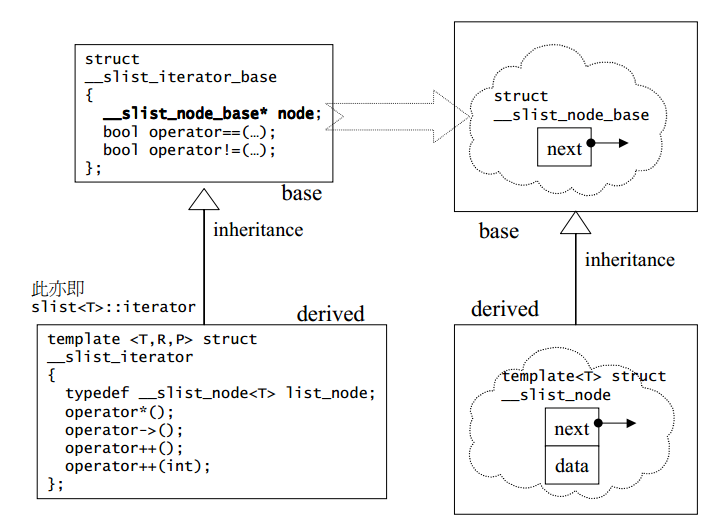4.5 stack
template <class T, class Sequence = deque<T> >
class stack {
// 以下的__STL_NULL_TMPL_ARGS 會開展為<>,見1.9.1 節
friend bool operator==__STL_NULL_TMPL_ARGS (const stack&, const stack&);
friend bool operator<__STL_NULL_TMPL_ARGS (const stack&, const stack&);
public:
typedef typename Sequence::value_type value_type;
typedef typename Sequence::size_type size_type;
typedef typename Sequence::reference reference;
typedef typename Sequence::const_reference const_reference;
protected:
Sequence c; // 底層容器
public:
// 以下完全利用Sequence c 的操作,完成stack 的操作。
bool empty() const { return c.empty(); }
size_type size() const { return c.size(); }
reference top() { return c.back(); }
const_reference top() const { return c.back(); }
// deque 是兩頭可進出,stack 是末端進,末端出(所以後進者先出)。
void push(const value_type& x) { c.push_back(x); }
void pop() { c.pop_back(); }
};
template <class T, class Sequence>
bool operator==(const stack<T, Sequence>& x, const stack<T, Sequence>& y)
{
return x.c == y.c;
}
template <class T, class Sequence>
bool operator<(const stack<T, Sequence>& x, const stack<T, Sequence>& y)
{
return x.c < y.c;
}注意:stack没有迭代器。
4.6 queue
template <class T, class Sequence = deque<T> >
class queue{
// 以㆘的__STL_NULL_TMPL_ARGS 會開展為<>,見1.9.1 節
friend bool operator== __STL_NULL_TMPL_ARGS (const queue& x, const queue& y);
friend bool operator< __STL_NULL_TMPL_ARGS (const queue& x, const queue& y);
public:
typedef typename Sequence::value_type value_type;
typedef typename Sequence::size_type size_type;
typedef typename Sequence::reference reference;
typedef typename Sequence::const_reference const_reference;
protected:
Sequence c; // 底層容器
public:
// 以下完全利用Sequence c 的操作,完成queue 的操作。
bool empty() const { return c.empty(); }
size_type size() const { return c.size(); }
reference front() { return c.front(); }
const_reference front() const { return c.front(); }
reference back() { return c.back(); }
const_reference back() const { return c.back(); }
// deque 是兩頭可進出,queue 是末端進,前端出(所以先進者先出)。
void push(const value_type& x) { c.push_back(x); }
void pop() { c.pop_front(); }
};
template <class T, class Sequence>
bool operator==(const queue<T, Sequence>& x, const queue<T, Sequence>& y)
{
return x.c == y.c;
}
template <class T, class Sequence>
bool operator<(const queue<T, Sequence>& x, const queue<T, Sequence>& y)
{
return x.c < y.c;
}注意:queue没有迭代器。
4.7 heap
heap并不属于STL容器组件,而是用于priority queue。heap内部用vector实现。
1、push_heap,pop_heap,sort_heap(将heap排序成由小到大),make_heap(默认生成最大堆)
注意:push_heap调用前程序员自行将元素push_back到vector中;pop_heap之后元素只是放置于尾部,并未取走,程序员自行调用pop_back取走。
2、heap没有迭代器。
4.8 priority_queue
以vector为底部容器,再加上heap处理规则;默认为最大堆,默认大小比较规则为less;无迭代器。
template <class T, class Sequence = vector<T>,
class Compare = less<typename Sequence::value_type> >
class priority_queue{
public:
typedef typename Sequence::value_type value_type;
typedef typename Sequence::size_type size_type;
typedef typename Sequence::reference reference;
typedef typename Sequence::const_reference const_reference;
protected:
Sequence c; // 底層容器
Compare comp; // 元素大小比較標準
public:
priority_queue() : c() {}
explicit priority_queue(const Compare& x) : c(), comp(x) {}
// 以下用到的make_heap(), push_heap(), pop_heap()都是泛型演算法
// 注意,任一個构造函数都立刻於底层容器內產生一個implicit representation heap。
template <class InputIterator>
priority_queue(InputIterator first, InputIterator last, const Compare& x)
: c(first, last), comp(x) { make_heap(c.begin(), c.end(), comp); }
template <class InputIterator>
priority_queue(InputIterator first, InputIterator last)
: c(first, last) { make_heap(c.begin(), c.end(), comp); }
bool empty() const { return c.empty(); }
size_type size() const { return c.size(); }
const_reference top() const { return c.front(); }
void push(const value_type& x) {
__STL_TRY {
// push_heap 是泛型演算法,先利用底層容器的push_back() 將新元素
// 推入末端,再重排heap。見C++ Primer p.1195。
c.push_back(x);
push_heap(c.begin(), c.end(), comp); // push_heap 是泛型演算法
}
__STL_UNWIND(c.clear());
}
void pop() {
__STL_TRY {
// pop_heap 是泛型演算法,從heap 內取出㆒個元素。它並不是真正將元素
// 彈出,而是重排heap,然後再以底層容器的pop_back() 取得被彈出
// 的元素。見C++ Primer p.1195。
pop_heap(c.begin(), c.end(), comp);
c.pop_back();
}
__STL_UNWIND(c.clear());
}
};
4.9 slist
SGI STL提供了一个单向链表slist(不属于标准规格,STL list是个双向链表)。slist的迭代器属于单向的Forward Iterator。注意,由于一个单向链表不能回头定出前一个位置,必须从头找起,所以只提供push_front(),而不提供push_back(),也不应该调用insert(插入操作会将新元素插入到指定位置之前,而非之后)或erase成员函数,不过slist还提供了insert_after()和erase_after()函数。
1、slist的节点
struct __slist_node_base
{
__slist_node_base* next;
};
// 單向串列的節點結構
template <class T>
struct __slist_node: public __slist_node_base
{
T data;
};
// 全域函式:已知某㆒節點,安插新節點於其後。
inline __slist_node_base* __slist_make_link(__slist_node_base* prev_node, __slist_node_base* new_node)
{
// 令new 節點的下一節點為prev 節點的下一節點
new_node->next = prev_node->next;
prev_node->next = new_node; // 令prev 節點的下一節點指向new 節點
return new_node;
}
// 全域函式:單向串列的大小(元素個數)
inline size_t __slist_size(__slist_node_base* node)
{
size_t result = 0;
for ( ; node != 0; node = node->next)
++result; // ㆒個㆒個累計
return result;
}
2、slist的迭代器
// 單向串列的迭代器基本結構
struct __slist_iterator_base
{
typedef size_t size_type;
typedef ptrdiff_t difference_type;
typedef forward_iterator_tag iterator_category; // 注意,單向
__slist_node_base* node;// 指向節點基本結構
__slist_iterator_base(__slist_node_base* x) : node(x) {}
void incr() { node = node->next; } // 前進㆒個節點
bool operator==(const __slist_iterator_base& x) const {
return node == x.node;
}
bool operator!=(const __slist_iterator_base& x) const {
return node != x.node;
}
};
// 單向串列的迭代器結構
template <class T, class Ref, class Ptr>
struct __slist_iterator: public __slist_iterator_base
{
typedef __slist_iterator<T, T&, T*> iterator;
typedef __slist_iterator<T, const T&, const T*> const_iterator;
typedef __slist_iterator<T, Ref, Ptr> self;
typedef T value_type;
typedef Ptr pointer;
typedef Ref reference;
typedef __slist_node<T> list_node;
__slist_iterator(list_node* x) : __slist_iterator_base(x) {}
// 呼叫slist<T>::end() 時會造成__slist_iterator(0),於是喚起㆖述函式。
__slist_iterator() : __slist_iterator_base(0) {}
__slist_iterator(constiterator& x) : __slist_iterator_base(x.node) {}
reference operator*() const { return ((list_node*) node)->data; }
pointer operator->() const { return &(operator*()); }
self& operator++()
{
incr(); // 前進㆒個節點
return *this;
}
self operator++(int)
{
self tmp = *this;
incr(); // 前進㆒個節點
return tmp;
}
// 沒有實作operator--,因為這是㆒個forward iterator
};
3、slist的实现
template <class T, class Alloc = alloc>
class slist
{
public:
typedef T value_type;
typedef value_type* pointer;
typedef const value_type* const_pointer;
typedef value_type& reference;
typedef const value_type& const_reference;
typedef size_t size_type;
typedef ptrdiff_t difference_type;
typedef __slist_iterator<T, T&, T*> iterator;
typedef __slist_iterator<T, const T&, const T*> const_iterator;
private:
typedef __slist_node<T> list_node;
typedef __slist_node_base list_node_base;
typedef __slist_iterator_base iterator_base;
typedef simple_alloc<list_node, Alloc> list_node_allocator;
static list_node* create_node(const value_type& x) {
list_node* node = list_node_allocator::allocate(); // 配置空間
__STL_TRY {
construct(&node->data, x); // 建構元素
node->next = 0;
}
__STL_UNWIND(list_node_allocator::deallocate(node));
return node;
}
static void destroy_node(list_node* node) {
destroy(&node->data); // 將元素解構
list_node_allocator::deallocate(node); // 釋還空間
}
private:
list_node_base head; // 頭部。注意,它不是指標,是實物。
public:
slist() { head.next = 0; }
~slist() { clear(); }
public:
iterator begin() { return iterator((list_node*)head.next); }
iterator end() { return iterator(0); }
size_type size() const { return __slist_size(head.next); }
bool empty() const { return head.next == 0; }
// 兩個slist 互換:只要將head 交換互指即可。
void swap(slist& L)
{
list_node_base* tmp = head.next;
head.next = L.head.next;
L.head.next = tmp;
}
public:
// 取頭部元素
reference front() { return ((list_node*) head.next)->data; }
// 從頭部安插元素(新元素成為slist 的第㆒個元素)
void push_front(const value_type& x) {
__slist_make_link(&head, create_node(x));
}
// 注意,沒有push_back()
// 從頭部取走元素(刪除之)。修改head。
void pop_front() {
list_node* node = (list_node*) head.next;
head.next = node->next;
destroy_node(node);
}
...
};






















 261
261











 被折叠的 条评论
为什么被折叠?
被折叠的 条评论
为什么被折叠?








